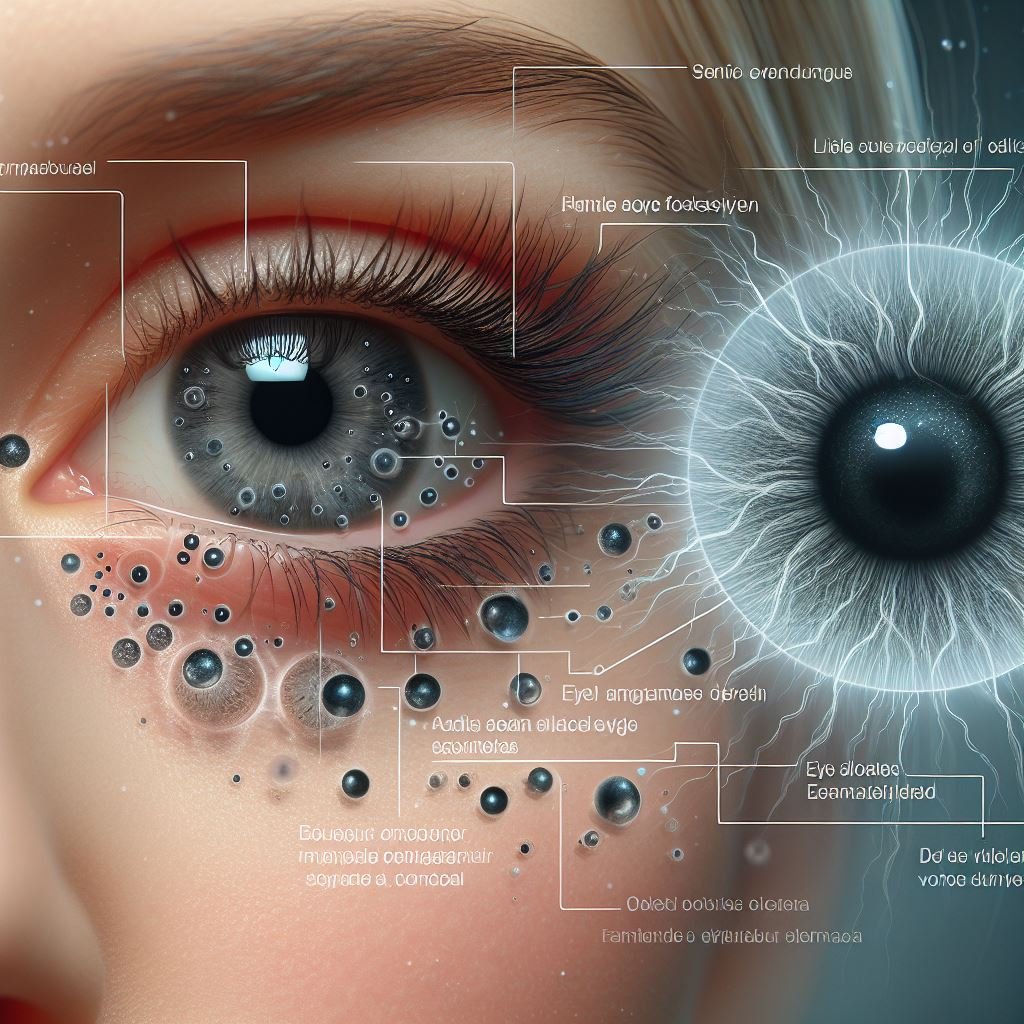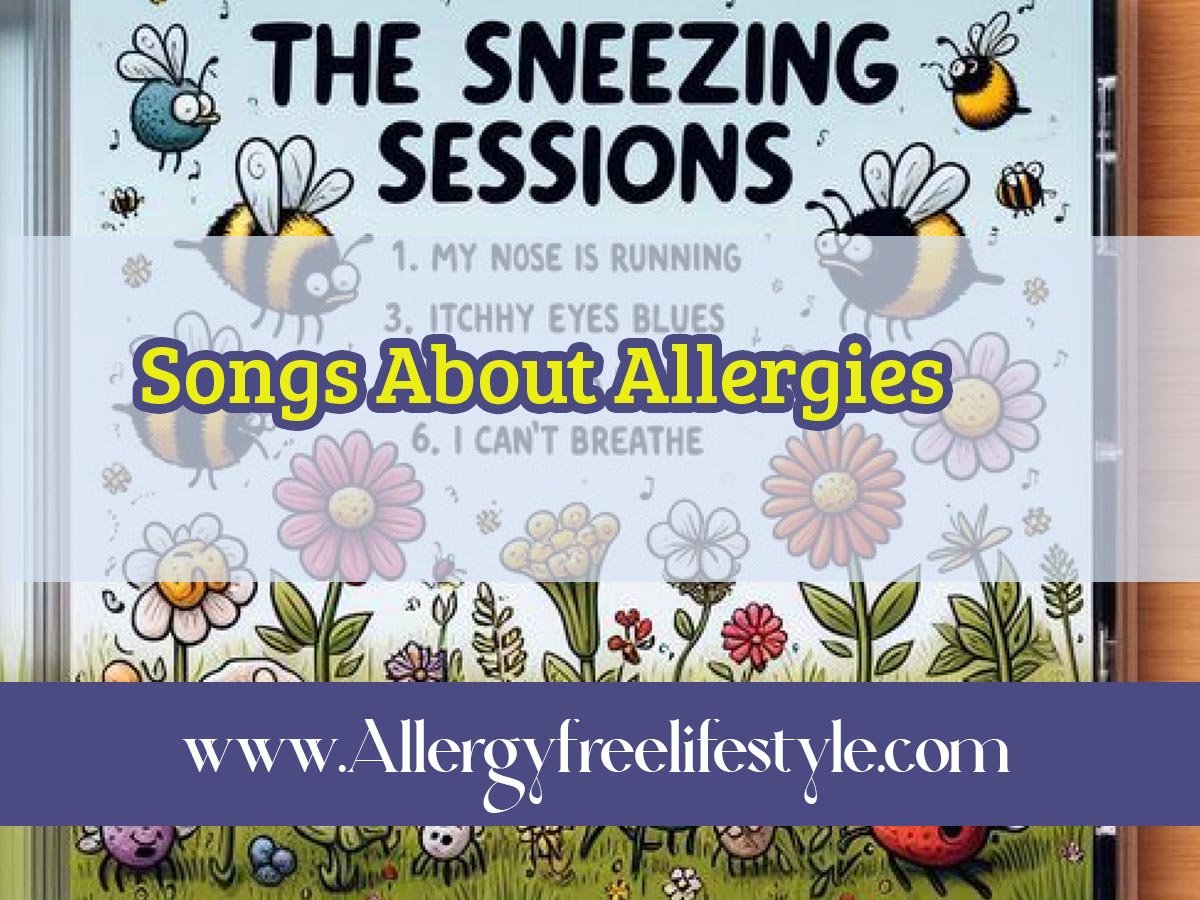Spring has sprung! While the season brings blooming flowers and warmer weather, it also triggers allergy season for millions. It’s a time of sniffles, sneezes, and a relentless battle against itchy eyes. But is it possible for our allergies to also surpass these common symptoms and affect our vision? Can allergies make your eyes blurry? Let’s find out
The human eye is a complex and delicate organ; allergic reactions can disrupt its normal functioning in several ways. This article will delve into the surprising connection between allergies and blurry vision. We’ll explore how allergic reactions trigger a cascade of events that can temporarily impair your sight. We’ll also differentiate between allergy-induced blurry vision and another common visual phenomenon – eye floaters. Finally, we’ll provide insights on treatment options and when to seek professional help from an eye doctor.
So, if you’ve ever experienced blurry vision alongside your allergy woes, keep reading! This article will shed light on the connection and empower you to take control of your eye health during allergy season.

Can Allergies Make Your Eyes Blurry?
Allergies occur when your immune system overreacts to a harmless substance, like pollen, dust mites, or pet dander. This triggers the release of chemicals called histamines, which act as the body’s defense soldiers. While histamines play a crucial role in the immune response, their actions can wreak havoc on your eyes during an allergy attack.
Here’s how the histamine battleground unfolds within your eyes:
- Inflammatory Onslaught: Histamines trigger inflammation in the conjunctiva, the thin membrane lining your eyelids and the white part of your eye. This inflammation causes the blood vessels in your eyes to dilate and become more visible, leading to redness and irritation.
- The Cornea’s Shape-Shifting Woes: The cornea, the clear dome at the front of your eye, plays a vital role in focusing light and creating clear vision. Unfortunately, inflammation from histamines can cause the cornea to temporarily change shape. This subtle alteration can significantly blur your vision, making it difficult to see clearly.
- Tearing Up the Battlefield: Your eyes naturally produce tears to keep them lubricated and remove irritants. During an allergy attack, however, the histamine assault can lead to excessive tear production. While tears are meant to be helpful, an overabundance can actually blur your vision by creating a temporary film on the surface of your eyes.
- Eyelid Edema Joins the Fray: Inflammation can extend beyond the conjunctiva and cause your eyelids to swell. This swelling can physically obstruct your vision, further contributing to blurry sight.
Eye Floaters vs. Allergy-Induced Blurry Vision
While both eye floaters and blurry eye allergy symptoms can disrupt your vision, they are caused by entirely different mechanisms. Here’s a breakdown to help you differentiate between the two:
Eye Floaters:
- Appearance: Tiny specks, dots, or wispy shapes that float across your field of vision, often described as cobwebs or flies.
- Cause: The vitreous humor, a gel-like substance that fills the inner chamber of your eye, naturally becomes more liquefied with age. These clumps of gel cast tiny shadows on your retina, the light-sensitive layer at the back of your eye, appearing as floaters.
- Impact: Eye floaters are generally harmless and don’t significantly affect your vision. They may be more noticeable when looking at a bright light background like a clear blue sky.
- Treatment: No treatment is typically needed for eye floaters. However, if you experience a sudden increase in floaters or flashes of light, it’s crucial to consult an eye doctor to rule out any underlying retinal problems.
Allergy-Induced Blurry Vision:
- Appearance: Blurry or hazy vision that can fluctuate in intensity.
- Cause: The inflammatory response triggered by allergies, as described in the previous section.
- Accompanying Symptoms: Often accompanied by other allergy symptoms like itchy, red, and watery eyes, runny nose, and sneezing.
- Resolution: The blurry vision typically resolves once the underlying allergy symptoms subside with treatment (antihistamines, eye drops) or when the allergen exposure is reduced.
Key Takeaway: Eye floaters are a normal part of aging and usually harmless, while allergy-induced blurry vision is a temporary symptom associated with an allergic reaction. If you experience blurry vision with no other symptoms, it’s best to consult an eye doctor to determine the cause.
You May Also Like:
Some Allergies That Cause Blurry Visions
- Ragweed Pollen: A notorious culprit for seasonal allergies, ragweed pollen can trigger intense eye irritation, redness, itching, and blurry vision, especially during peak bloom times (typically late summer and fall).
- Grass Pollen: Similar to ragweed, grass pollen can cause allergic conjunctivitis and its associated symptoms like blurry vision. This is particularly common during spring and early summer when grasses pollinate.
- Tree Pollen: Depending on your sensitivity, pollen from various trees like oak, birch, or elm can trigger eye allergies, leading to blurry vision alongside other symptoms.
- Dust Mites: These microscopic creatures thrive in warm, humid environments and can trigger year-round allergies. Dust mite allergens can cause itchy, watery eyes and blurry vision.
- Pet Dander: If you have a pet allergy, exposure to pet dander (flecks of dead skin) can lead to allergic conjunctivitis with symptoms like blurry vision, redness, and watering.
- Mold Spores: Mold growth indoors can release spores that trigger allergies. Mold allergy symptoms can include blurry vision, itching, and burning eyes.
- Cockroach Allergens: Cockroach droppings and body parts contain allergens that can cause year-round allergies, including itchy, red eyes, and blurry vision.
- Smoke: Exposure to smoke from cigarettes, fireplaces, or wildfires can irritate your eyes and lead to temporary blurry vision, redness, and tearing.
- Makeup: Certain ingredients in makeup, especially mascara and eyeliner, can cause allergic reactions in some people. These reactions can manifest as blurry vision, itching, and redness.
- Eye Drops: Ironically, even some eye drops, particularly those containing preservatives, can trigger allergic reactions in sensitive individuals. This can lead to blurry vision, redness, and worsening of symptoms.
Treatment Options and When to Seek Professional Help
Fortunately, there are ways to combat allergy-induced blurry vision and reclaim clear sight during allergy season. Here’s a breakdown of potential solutions:
- Artificial Tears: These lubricating eye drops can help wash away allergens and soothe irritated eyes, offering temporary relief from blurry vision caused by excessive tearing. Opt for preservative-free formulas for optimal comfort.
- Over-the-Counter Antihistamine Eye Drops: Antihistamines help counteract the effects of histamine, the culprit behind allergy symptoms. Eye drops formulated with antihistamines can specifically target the inflammation in your eyes, reducing redness, itching, and potentially improving blurry vision.
- Allergy Medication: Taking oral antihistamines or decongestants can address the underlying allergic reaction, reducing overall allergy symptoms including blurry vision. However, discuss these options with your doctor, as some medications can cause dry eyes, potentially worsening blurry vision.
- Minimizing Allergen Exposure: If possible, identify and avoid the allergens triggering your symptoms. This might involve keeping windows closed during high pollen counts, using air purifiers indoors, washing bedding frequently for dust mite allergies, or limiting contact with pets if you have pet dander allergies.
When to See an Eye Doctor
While allergy-induced blurry vision is often temporary and resolves with treatment, it’s important to seek professional help from an eye doctor in specific situations:
- Persistent Blurry Vision: If blurry vision persists even after managing your allergies with medication or avoiding triggers, it’s crucial to consult an eye doctor to rule out other potential causes.
- Sudden Worsening of Vision: A sudden and significant decline in vision can indicate a serious underlying eye problem. Don’t hesitate to seek immediate medical attention in such cases.
- Seeing Flashes of Light or Dark Spots: These symptoms can be associated with retinal detachment, a serious eye condition. If you experience flashes of light or dark spots alongside blurry vision, consult an eye doctor right away.
Conclusion: Can Allergies Make Your Eyes Blurry
So, can allergies make your eyes blurry?
Allergies may disrupt your springtime serenity with a symphony of sneezes and itchy eyes. But now you know they can also wage a silent war on your vision, leading to blurry sight. This article has demystified the connection between allergies and blurry vision, equipping you with valuable knowledge.
Remember, the key takeaways are:
- Allergies trigger inflammation in your eyes, which can temporarily change the shape of your cornea and disrupt clear vision.
- Eye floaters, on the other hand, are harmless and a natural part of aging.
- Artificial tears, antihistamine eye drops, and allergy medication can offer relief from allergy-induced blurry vision.
- Minimizing allergen exposure is crucial for long-term management.
By following these tips and seeking professional help when necessary, you can effectively manage allergy symptoms and ensure clear, uninterrupted vision throughout allergy season. So, keep your eyes on the prize – a season filled with blooming beauty and sharp vision!
FAQs about Can Allergies Make Your Eyes Blurry
- Can allergies really cause blurry vision?
Absolutely! Allergies trigger inflammation in your eyes, which can temporarily change the shape of your cornea and disrupt clear vision. This often occurs alongside other allergy symptoms like itching, redness, and watering eyes.
- What kind of allergies cause blurry vision?
Any allergy to airborne irritants can potentially lead to blurry vision. This includes allergies to pollen (seasonal or year-round), dust mites, pet dander, mold spores, smoke, and even certain cosmetics.
- How can I tell the difference between blurry vision from allergies and eye floaters?
Eye floaters are tiny specks or cobweb-like shapes that float across your vision. They’re harmless and a natural part of aging. Blurry vision from allergies is often accompanied by other symptoms like itchy, red eyes, and usually clears up with allergy treatment or reduced allergen exposure.
- What can I do to prevent blurry vision caused by allergies?
Minimizing allergen exposure is key. Track your allergy triggers (pollen counts, pet dander) and take steps to avoid them. Consider air purifiers indoors, washing bedding frequently, and using allergy medication during peak allergy seasons.
- What are some solutions for blurry vision from allergies?
Artificial tears can help wash away allergens and soothe irritated eyes. Over-the-counter antihistamine eye drops can target inflammation and reduce redness, itching, and potentially blurry vision. Oral allergy medication might also help manage overall symptoms.
- Should I see a doctor if my eyes are blurry from allergies?
While allergy-induced blurry vision is often temporary, consult a doctor if:
- Blurry vision persists even after managing allergies.
- You experience a sudden and significant decline in vision.
- You see flashes of light or dark spots alongside blurry vision.
- Are there any eye drops that can worsen blurry vision from allergies?
Ironically, some eye drops containing preservatives can trigger allergic reactions in sensitive individuals, leading to blurry vision and worsening symptoms. Consult your doctor for suitable eye drop options.
- Can wearing makeup cause blurry vision from allergies?
Yes. Certain makeup ingredients, especially in mascara and eyeliner, can trigger allergic reactions in some people, leading to blurry vision, itching, and redness. Consider hypoallergenic makeup options if you suspect this might be an issue.
- Is blurry vision from allergies a sign of a serious eye condition?
In most cases, no. However, persistent blurry vision or sudden vision changes can be indicative of other eye problems. Consulting a doctor ensures proper diagnosis and treatment.
- How can I keep my eyes healthy during allergy season?
- Manage allergies with medication and allergen avoidance.
- Use preservative-free artificial tears for eye comfort.
- Practice good eye hygiene, like washing your hands before touching your eyes.
- Schedule regular eye exams with your ophthalmologist.
11. Can allergies cause dry eyes and blurry vision?
Yes, allergies are a common cause of dry eyes. During an allergic reaction, your body releases histamines, which trigger inflammation in the tissues around your eyes. This inflammation can affect the tear glands, leading to decreased tear production and dry eyes. Dry eyes can irritate the cornea, the clear dome at the front of your eye, and contribute to blurry vision.



